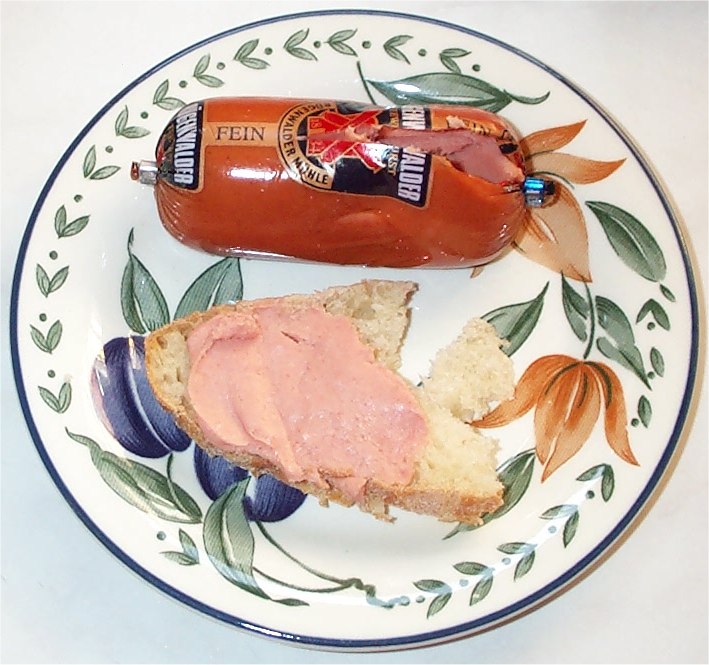Teewurst on:
[Wikipedia]
[Google]
[Amazon]
Teewurst () is a German  Teewurst was invented in
Teewurst was invented in History
/ref>
sausage
A sausage is a type of meat product usually made from ground meat—often pork, beef, or poultry—along with salt, spices and other flavourings. Other ingredients, such as grains or breadcrumbs, may be included as fillers or extenders.
...
made from two parts raw pork
Pork is the culinary name for the meat of the pig (''Sus domesticus''). It is the most commonly consumed meat worldwide, with evidence of pig animal husbandry, husbandry dating back to 8000–9000 BCE.
Pork is eaten both freshly cooke ...
(and sometimes beef
Beef is the culinary name for meat from cattle (''Bos taurus''). Beef can be prepared in various ways; Cut of beef, cuts are often used for steak, which can be cooked to varying degrees of doneness, while trimmings are often Ground beef, grou ...
) and one part bacon
Bacon is a type of Curing (food preservation), salt-cured pork made from various cuts of meat, cuts, typically the pork belly, belly or less fatty parts of the back. It is eaten as a side dish (particularly in breakfasts), used as a central in ...
; they are minced, seasoned and packed in casings (mostly porous artificial casings) before being smoked over beech
Beech (genus ''Fagus'') is a genus of deciduous trees in the family Fagaceae, native to subtropical (accessory forest element) and temperate (as dominant element of Mesophyte, mesophytic forests) Eurasia and North America. There are 14 accepted ...
wood. The sausage then has to mature for seven to ten days in order to develop its typical taste. Teewurst contains 30 to 40 percent fat, which makes it particularly easy to spread.
 Teewurst was invented in
Teewurst was invented in Pomerania
Pomerania ( ; ; ; ) is a historical region on the southern shore of the Baltic Sea in Central Europe, split between Poland and Germany. The central and eastern part belongs to the West Pomeranian Voivodeship, West Pomeranian, Pomeranian Voivod ...
, probably in the small Baltic
Baltic may refer to:
Peoples and languages
*Baltic languages, a subfamily of Indo-European languages, including Lithuanian, Latvian and extinct Old Prussian
*Balts (or Baltic peoples), ethnic groups speaking the Baltic languages and/or originatin ...
town of Rügenwalde (now Darłowo
Darłowo (; ; ) is a seaside town on the Slovincian Coast of north-western Poland, south of the Baltic Sea, with 13,324 inhabitants as of December 2021. Administratively, it is located in Sławno County in West Pomeranian Voivodeship.
The earlie ...
, Poland), in the middle of the 19th century. The name, which means ''tea sausage'', is said to derive from the habit of serving it in sandwiches at teatime.
Up to 1945, the sausage industry in Rügenwalde was well established, and Teewurst was its best-known product. In 1927, the term ''Rügenwalder Teewurst'' was declared a protected designation of origin
The protected designation of origin (PDO) is a type of geographical indication of the European Union aimed at preserving the designations of origin of food-related products. The designation was created in 1992 and its main purpose is to designat ...
. After World War II
World War II or the Second World War (1 September 1939 – 2 September 1945) was a World war, global conflict between two coalitions: the Allies of World War II, Allies and the Axis powers. World War II by country, Nearly all of the wo ...
, sausage makers from Rügenwalde fled or were expelled to the Federal Republic of Germany
Germany, officially the Federal Republic of Germany, is a country in Central Europe. It lies between the Baltic Sea and the North Sea to the north and the Alps to the south. Its sixteen constituent states have a total population of over 84 ...
, where they established new companies and resumed the production of Teewurst. They established an association of former Rügenwald sausage makers, which registered the trademark ''Rügenwalder Teewurst'' in 1957. Teewurst was also made in East Germany
East Germany, officially known as the German Democratic Republic (GDR), was a country in Central Europe from Foundation of East Germany, its formation on 7 October 1949 until German reunification, its reunification with West Germany (FRG) on ...
, but the brand ''Rügenwalder Teewurst'' was never used there. Today, only companies that once had their headquarters in Rügenwalde are allowed to use the term ''Rügenwalder Teewurst''. All others use the terms ''Teewurst'' or ''Rügenwalde-style Teewurst''./ref>
See also
* Ham sausage *List of smoked foods
This is a list of smoked foods. Smoking (cooking), Smoking is the process of seasoning, flavoring, cooking, or food preservation, preserving food by exposing it to smoke from burning or smoldering material, most often wood. Foods have been smoke ...
*
References
Bibliography
* German sausages Smoked meat Raw sausages {{germany-sausage-stub